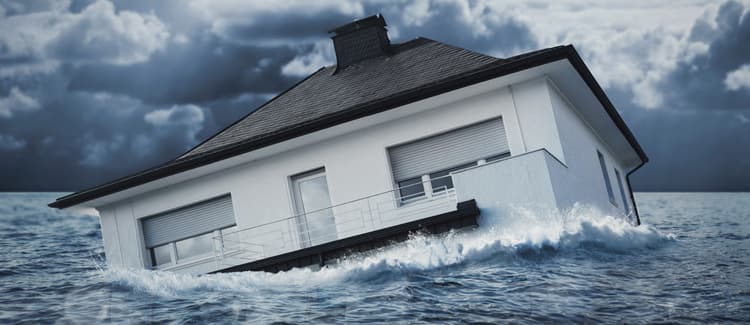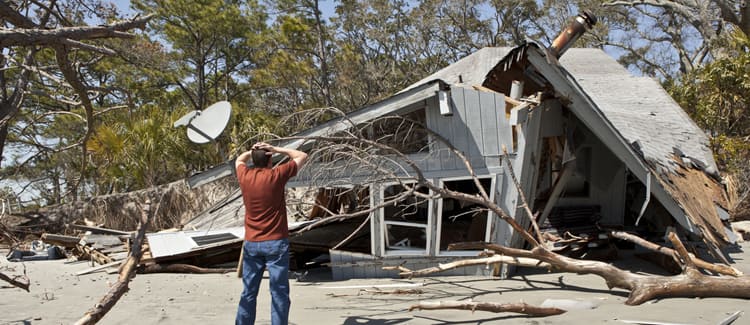So that we know what to call you.
We'll send your policy copy & important updates to this number.






Flood Insurance
Floods don’t announce their arrival. Even a couple of extra centimeters of rain or an unprecedented monsoon season can prove colossal damage for local homes. In such situations, owning flood insurance will not only give you peace of mind but will also keep you financially protected in case of any unplanned liabilities arising out of a natural disaster. This article will help you understand everything you wanted to know about flood insurance.
![]() Table of Content
Table of Content
What is Flood Insurance?
Flood Insurance is a sub-type of house insurance that covers property damaged by excessive water entering the house due to a flood. Since floods are a common occurrence in India due to its geographical diversity, a lot of regions have a high risk of being affected by floods and even by other natural disasters, such as storms, cyclones, and avalanches.
Flood Insurance works like any other insurance services. There is an annual premium to be paid which is estimated based on the damage risk of the house to be insured and the choice of deductibles. If the house or its contents are damaged in the event of a flood, the policyholder will receive the compensation amount for repairs or replacement.
Benefits of Owning Flood Insurance
Flood insurance is served as a distinct home insurance policy that provides coverage for buildings, the home owner's contents, and any other financial asset that would be affected by the flood. Such coverage include compensation for both repairs and total loss/damage. Following are the benefits of a flood insurance policy:
- Compensation for repairs in case of unprecedented flood conditions leading to structural damage to a building
- Comprehensive coverage for your financial assets and personal possessions
- Aids you to recover faster from monetary losses in the case of substantial damage to your property due to floods
- Helps you live with peace of mind even in disaster-prone areas
What is Covered Under Flood Insurance?
Following incidents are covered under a flood insurance policy:
- Damage Due to Water Leakage/Seepage: Any type of rain/flood water leaking through the walls of the house leading to damage to the structure of the building is covered.
- Significant Structural Damage: This includes anything that affects the structure of the property, including the paint of the house to internal pillars, getting weak due to water.
- Damage Sustained by House Furniture: If the furniture of your house is covered by the flood insurance company, you will be provided compensation in case there is loss/damage due to floods.
- Damage Caused to the House Flooring: You will also be covered in case floodwater entering the house provides substantial damage to the flooring of the property.
- Damage Caused to the House Ceiling: Stagnated rain/flood water can weaken the structural strength of the roof of your house leading to damage. If a situation like this arises, you will be compensated by your flood insurance company.
- Short Circuit/Electrical Fault: Water leakage can prove to be dreadful if any of it seeps into the electrical circuits of the house. Such situations can lead to a short-circuit or an even more dangerous mishap. Flood insurance will keep you covered under such situations.
What is Not Covered Under Flood Insurance?
Flood insurance companies exclude the following adversities from their insurance policies:
- Delayed Information: The insurer will not provide any compensation if the damage was not informed about on time
- Non-disclosure of Any Existing Damage: The home insurance company will expect the policyholder to provide all the exact information about the building's physical structure at the time of purchasing the policy transparently. Failure to do so shall compel the insurer to not provide any compensation at the time of inspection of the damage caused by floods.
- Debris: Any type of removal of debris from the property shall not be covered under a flood insurance policy.
- Intentional Damage:In case there is intentional damage caused by the owner willingly, the insurer shall not be liable to provide any compensation.
- Intentional Negligence:In case there has been structural damage to the building due to water entering the house, which could've been prevented by the owner but they failed to do so on account of negligence, then no compensation will be provided by the flood insurance company.
How to Raise a Claim Under Flood Insurance?
Follow these easy steps to file a flood insurance claim in the case of a mishap caused by floods:
Step 1: Notify the Flood Insurance Company
The first step involves notifying your insurance company immediately after you witness the mishap in your house. Make sure that you keep your policy document handy. You can raise a claim by either calling your insurer on the emergency contact number mentioned in your policy document or even mail them using your registered email ID.
Step 2: Document the Sustained Damage
One of the most important steps in this process is to document the damages caused to your property. This is crucial as without any substantial evidence your insurer might deny you any compensation amount for the raised claim. So, make sure that you click clear photographs of the damage.
Step 3: Send a List of All the Damaged Items to Your Insurance Company
In addition to documenting all the damaged items with a camera, make sure that you prepare an inventory that includes a list of all the damaged items, their monetary value, date of purchase, original invoice/bills that you may have kept, and send them to your flood insurance company.
Step 4: Inspection
Once all the documents have been sent by you to the insurer. They will now send an agent for an inspection to verify all the listed damaged items and their photographs which were shared by you while raising a claim with the insurer.
Step 5: Receiving Compensation for the Claim,
After the inspection is done and the documents and their amounts have been verified, your claim will be approved. The insurer will then initiate the process of the compensation.
How to Renew Your Flood Insurance Policy?
Once you have bought a flood insurance policy, make sure that you retain it by renewing it before the tenure of the policy ends. This will enable you to recover faster in the event of a mishap.
You can easily renew flood insurance online. All you need to do is go to your flood insurance company’s website and log in to your existing account with your policy number and other credentials. You can then pay the flood insurance renewal premium and renew your flood insurance policy.
Why to Buy Flood Insurance from Policybazaar
You can easily look for an affordable flood insurance quote on Policybazaar Insurance Brokers Private Limited and find the most appropriate flood insurance online that suits your requirements.
FAQs About Flood Insurance
-
Q1. Will my submerged vehicle be also covered under my flood insurance policy?
No, your flood insurance policy is a sub-part of your home insurance policy and will only provide coverage for any damages sustained by your house.
-
Q2. Is flood insurance premium the same for every house?
No. Since the premium depends on a lot of factors, flood insurance cost generally varies between two houses.
-
Q3. What factors affect the cost of flood insurance premiums?
The cost of the flood insurance policy depends on a lot of factors. These factors include the location of your house, the size of the house, the structural strength of the house as well as the risk of floods in your locality.
Disclaimers+





























